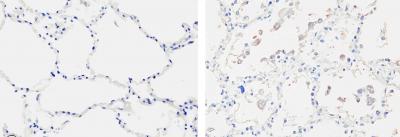Researchers have uncovered the mechanism that contributes to the buildup of fibrous lung tissue in patients with severe acute respiratory syndrome (SARS), finding that a SARS viral protein important for replication can enhance pulmonary fibrosis by inhibiting the activity of the enzyme that breaks down connective tissue. The results offer up a new pathway to treat the pulmonary damage of SARS.
Infection with the SARS virus can lead to severe inflammation in the lungs, which can lead to respiratory distress, fibrosis, and eventually lung failure. Ye-Guang Chen and colleagues tested the effect of a SARS viral protein, the nucleocapsid protein (the protein that binds the virus’s genetic material), on human lung cells and found that this protein can bind to a cellular protein called Smad3.

By associating with Smad3, the nucleocapsid protein accomplishes two things. First, it prevents Smad3 from binding to its partner Smad4 and initiating cell suicide, allowing the virus to replicate longer.
At the same time, Smad3-Nucleocapsid binding stimulates a separate pathway that promotes the production of collagen and an inhibitor (PAI-1) of the plasminogen protein, which breaks down non-cell materials and other build-up in the body, leading to lung fibrosis. So, in a trade-off, the SARS virus increases its short-term gain at the expense of long-term damage to its host.